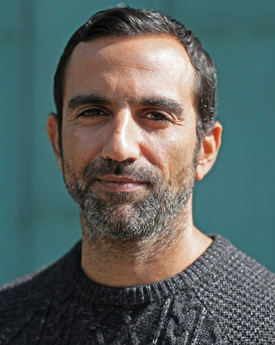
Who’s Who: Angelos Marnerides
- 9:19AM Apr 27, 2020
- Comments off
I truly enjoy and feel lucky with the constant learning process I experience through interactions with many bright collaborators on almost a daily basis.
Get to know EASY-RES team member Angelos Marnerides in our current Who’s who interview. Angelos is working with his team on establishing an ICT architecture in Work Package 4 of EASY-RES.
Angelos, what is your personal and professional background?
I am a Greek-Cypriot, born and raised in the beautiful coastal city of Larnaca, at the sunny island of Cyprus. My family comes from the city of Famagusta that is illegaly occupied by the Turkish troops since the Turkish invasion of Cyprus back in 1974. My strong interest in science and technology was nurtured through my parents having my father being a power engineer and my mother a chemistry high school teacher. I also have three brothers who definitely influenced me since all three of them are professionally also into science(Physics/Maths), engineering and medicine.
After my 2 year army service I left Cyprus in 2003 to pursue a B.Sc in computer science (2006) and then to obtain my M.Sc and Ph.D from Lancaster University in the area of computer networking (2007, 2011). After the completion of my studies I worked as a postdoctoral researcher in various institutions including the University of Porto (Portugal), Carnegie Mellon University (USA) and University College London (UK). In 2014 I got my first lectureship at Liverpool John Moores University and in 2016 I moved to Lancaster University as an Assistant Professor of Computer Networking.
I currently serve as the founding director of the innovative Digital Infrastructure Defense (i-DID) group (https://www.lancaster.ac.uk/security-lancaster/research/idid/) within the Security Lancaster Institute. My research is focused on applied cybersecurity and resilience mechanisms for Internet-enabled cyber-physical systems. The philosophy in my work is in designing algorithms and networked systems with strong theoretical foundations and in providing practical, data-driven implementations that are deployable in the real world.
How did you get involved with EASY-RES and what are your/ your WPs responsibilities within the project?
My group was approached by the EASY-RES coordinator through the University of Passau with which we have an ongoing collaboration in topics related to Internet resilience. In contrast with the rest of the partners in EASY-RES, Lancaster University and the University of Passau are the only ICT partners dealing with the communication infrastructure underpinning the operations of the EASY-RES ecosystem. We are heavily involved with Work Package 4 where the focus is to design and implement an end-to-end resilient and secure communication infrastructure between renewable energy sources and TSO/DSO power components.
Relating to this, why is EASY-RES crucial for your daily work at University of Lancaster?
EASY-RES has brought a number of challenging research topics related to the security and resilience of legacy devices/software currently deployed in real power grid infrastructures. Indeed, the power grid is facing an emerging shift in order to get “smarter” and more ubiquitous however many of the aforementioned challenges are big obstacles towards this goal. Consequently, lessons learned from EASY-RES are also applied in other projects in which the group at Lancaster is involved with.
What do you enjoy the most about your work?
In general, I do enjoy the process of decomposing a complex problem and trying to tackle it over different scientific methods. Trial and error can potentially be frustrating nonetheless the feeling of success when a task is addressed cannot be adequately described in words. In parallel, I truly enjoy and feel lucky with the constant learning process I experience through interactions with many bright collaborators on almost a daily basis.
Which private projects or dreams would you like to fulfil?
A private project (which I am currently designing/implementing) deals with the real-time macroscopic analysis, detection and forecasting of cyber threats (e.g., ransomware, viruses) on the global Internet scale. In summary, I am trying to work around how the designed approach can be quantified and further correlated with human behaviour and country-level security and safety policies. A dream would be for that approach to steer a new research direction as well as to be adopted and widely used by governmental entities, commercial organisations and end-users.
There has to be some silver lining in this current situation confronted with the corona virus. What is the most positive change you are expecting to emerge during the next weeks/months?
I am hopeful and expecting to see people getting more unified and start appreciating simple things in life (e.g., a day at the beach with their loved ones) going beyond materialistic needs and desires. I truly hope for people to start placing more hope in humanity and realise that life is too short for holding grudges. It might not be easily observable during the next weeks/months but the unfortunate situation we currently experience with will act as the cornerstone for a better future.

